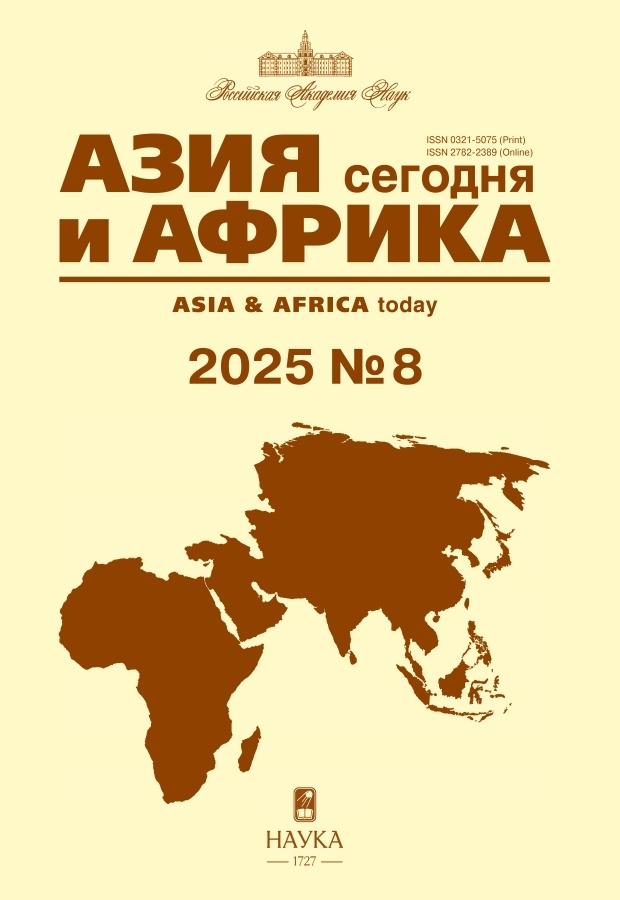Asia & Africa today
Media registration certificate: № 0110157 от 04.02.1993
The monthly academic journal and Russia's only periodical focusing on topics and issues in Asia and Africa. (The issues of CIS countries are not considered in the journal.)
Published since July 1957
Until March 1961 has been issued under the title "Sovremennyi Vostok" / "Contemporary East".
Founders
- Russian Academy of Sciences
- Institute of Oriental Studies RAS
- Institute for African Studies
Publisher
- Russian Academy of Sciences
The journal is published under the supervision of the RAS Department of Historical and Philological Sciences (OIFN RAS).
About the journal
Mission of the Journal is to provide a platform for authoritative researchers from Russia, CIS and other countries to discuss processes and events taking place in Asia and Africa.
"Asia and Africa today" publishes scholarly articles on the political, economic and social processes of Asian and African states, their culture and art, reviews of Asian and African literature. The Journal also publishes reviews of the most important scientific events - international conferences of orientalists, symposia and scientific expeditions.
"Asia and Africa today" journal’s authors and audience includes scholars, researchers, PhD students and humanities students, as well as politicians, public figures, experts of Russian and foreign organizations that work with Asian and African countries.
The author's point of view does not necessarily coincide with that of the editorial board.
Objectives
Analysis of socio-political, economic, demographic, environmental, cultural and other processes in Asian and African countries and their history.
The major areas and subjects for presentation in the journal:
- political development of Asian and African countries;
- economic problems of Asian and African countries;
- international relations;
- development economics;
- Asian and African states’ activities in UN and regional international organizations;
- pandemic in Asia and Africa;
- globalization and regionalization;
- civilizational development issues;
- problems of society and the state, democracy and autocracy;
- the emergence and features of civil society;
- food problem in developing states;
- demographic processes and migrations of the population
- aggravation of environmental problems in Asian and African continents;
- ethnic and interfaith conflicts;
- Islam and Christianity and their influence on political processes in Asian and African countries;
- culture, science, education, literature, art;
- religions, beliefs, cults;
- traditions, customs, morals;
- chapters of history;
- Russia – Asia and Africa (political, economic, cultural and other relations of Russia with Asian and African countries).
Tasks
- Assistance to scientific research in the field of Oriental and African studies. Publication of materials on the basis of topical research and theses, and also based on the results of overseas trips and fieldwork. Reviews of key Russian and international conferences and symposiums.
- Involving prominent Russian and foreign researchers as authors.
- Reviewing the most significant works and monographs on the journal’s topics.
- The practical help to young orientalists and africanists. Publication of their materials under the heading "Post-graduate Column".
- Cooperation with Oriental research Centres and Faculties of the Russian higher education institutions, as well as with foreign higher education institutions and research centres. Attraction of researchers and academic lecturers as journal authors. Strengthening and development of cooperation with co-founders of the journal - Institute of Oriental Studies and Institute for African Studies of the Russian Academy of Sciences.
Policy
- Prompt reaction to the events taking place in Asian and African countries.
- Extending of topics and improvement of quality of materials to be published.
Indexing
The journal is included in the Higher Attestation Commission List of peer-reviewed scientific publications.
- Russian Scientific Citation Index – a database, accumulating information on papers by Russian scientists, published in native and foreign titles. The Russian Scientific Citation Index project is under development since 2005 by “Electronic Scientific Library” foundation ( elibrary.ru).
- Russian Science Citation Index on Web of Science in partnership with Russia’s Scientific Electronic Library ( eLibrary.ru).
- EBSCO Publishing
最新一期
编号 8 (2025)
Top problem
Participation of Bandung Countries in the Formation of the Big Eurasian Partnership (to the 70th Anniversary of the Bandung Conference)
摘要
 5-13
5-13


Politics, economics
Autonomy as a Condition for Development of National Digital Platforms: Experience of Russia and China
摘要
 14-21
14-21


Women in Mauritius: Social Status and Political Activity
摘要
 22-30
22-30


The Role of Western Media in Shaping the Perception of Russia by the Population of West Africa
摘要
This study is aimed at assessing the role of Western media in shaping the perception of Russia by the population of West Africa. The study employed qualitative research methods. The study leveraged the data collected during the field work on the image of Russia in Africa for three years (2020–2023). Thematic analysis was employed to analyse the data gathered through the expert interviews. The thematic analysis was supported by verbal quotations from the expert interviews. The key and ground-breaking finding of this study is that there is a positive relationship between the role of Western media reporting on Russia and its influence in shaping the perception of West Africa about Russia, showing that the more the reportage of Russia by Western media, the more the likelihood of resulting to a positive image about Russia. Other key findings include the fact that USSR support and current Russia political, economic and military support in West Africa has a positive influence on people's perception of Russia. It is, therefore, imperative for Russia to strengthen and improve its relationship with Africa beyond just the military cooperation to mutually beneficial economic and infrastructural cooperation in order to maintain a long-term positive image in Africa.
 31-38
31-38


Japan: Generation Z is Willing to Pay to be Fired
摘要
 39-47
39-47


Political portrait
Nitish Kumar – the Leader of Bihar
摘要
 48-56
48-56


Field research
Men’s and Women’s Roles in the Family and Society: Perceptions of Tanzanian Students
摘要
 57-66
57-66


Scientific life
Africa’s Development: Plans and the Involvement of External Actors
摘要
 67-70
67-70


Culture, literature, art
Teju Cole: Genius of the Place
摘要
 71-78
71-78











